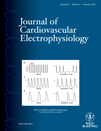Intravenous Epinephrine Infusion Test in Diagnosis of Catecholaminergic Polymorphic Ventricular Tachycardia
The study was financially supported by the Finnish Foundation for Cardiovascular Research, Sigrid Juselius Foundation, the Finnish Academy, the Finnish Cultural Foundation, Helsinki, Finland, and Kirsti och Tor Johanssons Hjärtoch Cancerstiftelse.
No disclosures.
Abstract
Epinephrine Infusion in Diagnosis of CPVT. Introduction: A test involving intravenous infusion of epinephrine has been proposed as a method alternative to exercise stress test in diagnosis of catecholaminergic polymorphic ventricular tachycardia (CPVT). We aimed at estimating the predictive value of intravenous epinephrine administration in CPVT patients with frequent exercise-induced ventricular ectopy.
Methods and Results: We recruited 81 subjects, including 25 CPVT-linked ryanodine receptor 2 (RYR2) mutation carriers, 11 genetically undefined CPVT patients, and 45 unaffected family members. All subjects underwent a maximal exercise stress test and an intravenous epinephrine infusion test. Exercise stress test was positive in 25 (31%) patients including 14 of 25 (56%) established RYR2-mutation carriers and all 11 (100%) genetically undefined CPVT patients. Epinephrine infusion induced arrhythmias in 3 (12%) RYR2-mutation carriers, 4 (36%) genetically undefined CPVT patients, and 1 (2%) unaffected family member. A total of 18 exercise stress test positive patients did not respond to intravenous epinephrine administration, whereas only 1 epinephrine test responder had a normal exercise stress test. Thus, if exercise stress test is used as a standard, the sensitivity of the epinephrine infusion test is 28% and specificity is 98%.
Conclusions: Intravenous epinephrine infusion has low sensitivity and may not be considered as an alternative method for a maximal exercise stress test in diagnosis of CPVT. (J Cardiovasc Electrophysiol, Vol. 23, pp. 194-199, February 2012)




